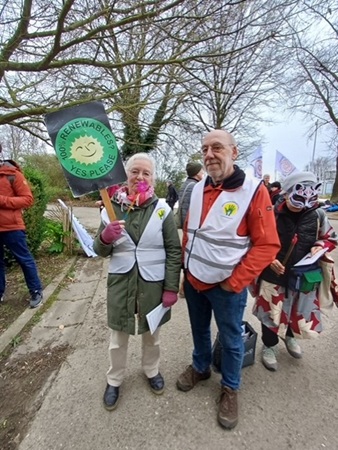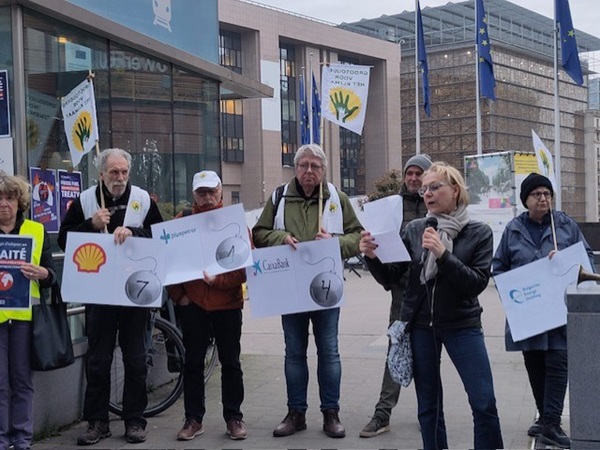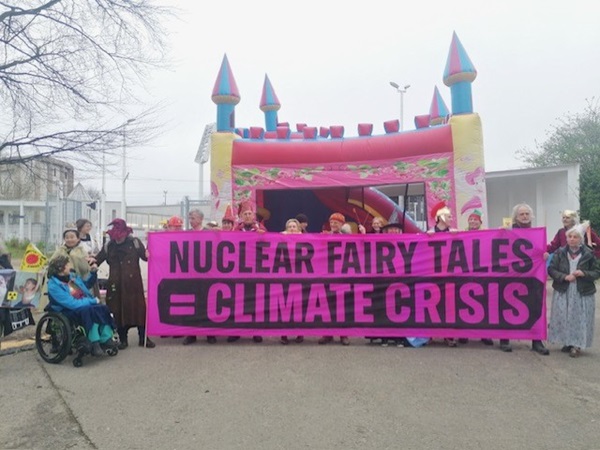By Wilfried Defillet and Axel Van de Veegaete
How nuclear power interferes in the climate debate
A summit on nuclear energy, organised by Belgian Prime Minister De Croo and the International Atomic Energy Agency (IAEA), took place in Brussels on Thursday 21 March. Nuclear energy is a very controversial topic and that was clear that Thursda
There were two demonstrations. One where defenders of nuclear power highlighted the benefits of nuclear power: no CO2 emissions thus saving the climate. And one where opponents showed a different narrative: nuclear power is dangerous, the development too slow, too expensive and a source of radioactive waste. The slogan of the latter group was: ‘Nuclear fairy tales = climate crisis’.
Global statement
More than 600 organizations worldwide, including Grandparents for Climate, also launched a statement that Thursday: Safe, affordable and climate-friendly energy for all. In short, these organizations argue that the development of new nuclear power is too slow to address the climate emergency: “Nuclear power plants under development are severely delayed and will not be able to make a meaningful contribution to reducing carbon emissions this decade. While greenhouse gas emissions must be drastically reduced by 2030 to limit global temperature rise to less than 1.5 degrees. What we need is a 100% renewable energy system combined with energy efficiency and measures to avoid excessive energy consumption.”

The statement continues: “Nuclear power is much more expensive than renewable energy. The cost of new power plants is already spiralling out of control even before they are built. Renewables, on the other hand, are cheaper than ever before and are falling sharply in relative cost compared to nuclear. Nuclear power is dangerous. From uranium mining to radioactive waste, nuclear power production is a risk to health, safety and the environment. Last but not least, nuclear power can be used as a military target and increases the risk of nuclear proliferation around the world, the use of depleted uranium and atomic bombs.”
Non-proliferation Treaty for fossil fuels.
The same day, Thursday 21 March, the Flemish and Walloon Grandparents for Climate took part also in a demonstration on the occasion of the meeting of the European Council of the Heads of States to demand that the 27 member states of the EU would sign the non-proliferation treaty for fossil fuels.

The action ‘Stop the climate bombs and signing a Non-proliferation Treaty for Fossil Fuels’ was an event by Rise for Climate Belgium, Extinction Rebellion Belgium and Youth For Climate.
The crucial issue for the climate movement here is the urgent and radical phasing out of fossil fuels. Actually, there are 425 active ‘climate bombs’: gas -, coal – and oil plants, each of which will emit 1 billion tons of CO2 over their lifetime. Altogether they account for emissions of 1,182 gigatons. If we want to limit warming to 1.5°C, we cannot exceed a global maximum of 400-500 gigatons.
Further exploitation and especially the mining of new bombs must be stopped urgently. As many as 20 new climate bombs have been launched between 2020 and 2022. NGOs have also denounced the fact that many European companies and banks are involved in more than 100 climate bombs. Therefore, European Union member states must urgently sign the Non-Proliferation Treaty. The European Parliament and the WHO support the proposal, but only 12 countries, mostly island states threatened by sea rise, have already signed.
